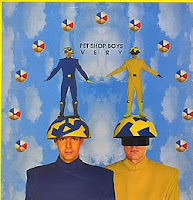 "As one producer put it concisely, the pop song is “a little three-minute novel,” in which reality and daydream merge in a sort of fairytale of love or of anonymous ambitions.” (1) And how could these fairytales be translated without lyrics? Lyrics are the cornerstone of any good pop or rock song. While the 90’s most famous lyrics may well be “MmmBop” and “Zig-eh-Ziga”, we shouldn’t give up on the decade as altogether senseless. If for no other reason than that the Pet Shops Boys (PSB) released four literally amazing albums in the 90’s. While lyrics can sometimes be inconsequential to a pop song, this has never been the case for the PSB. The lyrics have always been a key source of enjoyment from one of their albums. Take, for example, their best 90’s album, Very, which offers up lyrics which are witty, resonating and best of all, largely interpretational.
"As one producer put it concisely, the pop song is “a little three-minute novel,” in which reality and daydream merge in a sort of fairytale of love or of anonymous ambitions.” (1) And how could these fairytales be translated without lyrics? Lyrics are the cornerstone of any good pop or rock song. While the 90’s most famous lyrics may well be “MmmBop” and “Zig-eh-Ziga”, we shouldn’t give up on the decade as altogether senseless. If for no other reason than that the Pet Shops Boys (PSB) released four literally amazing albums in the 90’s. While lyrics can sometimes be inconsequential to a pop song, this has never been the case for the PSB. The lyrics have always been a key source of enjoyment from one of their albums. Take, for example, their best 90’s album, Very, which offers up lyrics which are witty, resonating and best of all, largely interpretational.
"Dreaming of the Queen" is certainly an example of this multiplicity of readings. On the surface it is, as the title implies, about a dream of visiting the Queen of England and Princess Di for a cup of tea. However, deeper inspection of the lyrics allow us to conceive the song as being about the toll that AIDS has taken on the gay community; rendering it a space where love has died: "There are no more lovers left alive/No one has survived.” This is one popular reading of the song, which pegs it as a gay text. Gregory Wood’s once said “A gay text is one which lends itself to the hypothesis of a gay reading, regardless of where the author's genitals were wont to keephouse.” (2) Under this definition, almost all PSB songs can be understood as gay texts. In fact, one of the most discussed elements of PSB lyrics are their queer sensibility and accessibility regardless of sexuality. For instance, many of their love songs will never refer to a ‘he’ or a ‘she’, instead addressing the object of affection just as ‘you’. This is just one way in which PSB liberate pop lyrics (which, let’s face it, are more times than not to do with love) for a queer audience.
Another diamond track from Very, is the snarky “Yesterday When I Was Mad”. It is a bombastic, energetic tune which, as the Rolling Stone review put it, makes clear that "the Boys have a few axes to grind." (3)
"Darling, you were wonderful, you really were quite good,
I enjoyed it, though of course, no-one understood.
They wondered what was going on, they didn't have a clue,
They didn't understand your sense of humour like I do.
"You're much to kind",
I smiled with murder on my mind."
The song expresses the irritation roused by critics, press and others in the music biz, who all have a back-handed complement or condescending remark to make. The verses serve up these insincere comments: “You have a certain quality, which really is unique/Expressionless, such irony, although your voice is weak,” which are reacted to with Neil’s biting chorus line: "I smiled, with murder on my mind." "Admitting I don't believe in anyone's sincerity, and that's what really got to me," implies a sense of jadedness; that the insincerity of some has detracted from the enjoyment of any accolade. This is pointed at as the main cause of his venting frustration. The songs closing lyric: "Then, when I was lonely, I thought again and changed my mind..." suggests that these ass-kissing falsities aren’t the worst fate. Better to have people clamouring around you with their barbed, fake complements than to stand alone. For tracks like “Yesterday When I Was Mad”, it is the lyrics which are the main attraction – the music plays a subservient role to the songs narrative.
My favourite lyric from Very comes from “Young Offender”, about an older gay man who still feels vibrant but no longer turns heads. In his mind he has a conversation with the young man he wants, but who doesn’t even see him.
Through a brief three-track look at the PSB album, Very, we can appreciate how lyrics can invite, amuse or provoke thought in their respondents. It is the diversity of meaning in lyrics which makes Very an excellent 90’s album and one worth listening to again and again.
References
(1) Hennion, A. 1983. 'The Production of Success: An Antimusicology of a Pop Song'.Eds. Simon Frith and Andrew Goodwin. On Record . (1990) Routeledge Publishing. pg. 156.
That's perhaps more polite than Frank Zappa's invitation to critics in "Packard Goose" to sit on a kitchen utensil.
ReplyDeleteLyrics are interesting, because while as you mentioned they don't need to be any good for a song to become successful, good lyrics greatly add to the experience. Music can communicate basic emotions and ideas, but lyrics can convey a far wider and more abstract range of topics.